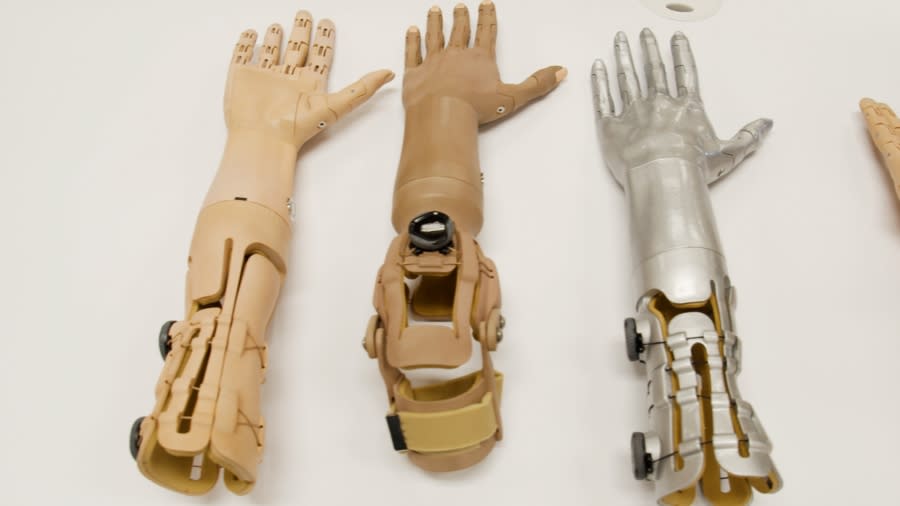Is this 3D-printed robotic arm the future of prosthetics?

Story at a glance
There are more than 57 million amputees worldwide and only about 5 percent of them have access to prosthetic care and technology.
Small prosthetics company Unlimited Tomorrow in Rhinebeck, N.Y., is shaking up the industry.
The company’s TrueLimb is a durable, 3D printed prosthetic arm with bionic functionality.
It is projected that there are more than 57 million amputees worldwide and only about 5 percent of them have access to prosthetic care and technology.
Those that do have access to prostheses are often burdened with an inconvenient fitting and training process, high price tags of up to $80,000, and long wait times of more than a year.
Despite the often-cumbersome user experience present in the current prosthetics landscape, there has been little structural change in the market for more than 50 years, experts say. The global prosthetics and orthotics industry was valued at $6.1 billion in 2020 and is expected to grow to $8.6 billion by 2028.
But a small prosthetics company called Unlimited Tomorrow in Rhinebeck, N.Y., is shaking things up.
Unlimited Tomorrow was founded in 2014 by robotics prodigy Easton LaChappelle. When LaChappelle was 14-years-old, he created a control-glove-operated bionic hand and entered it into the Colorado State Science Fair. LaChappelle’s project caught the eye of a 7-year-old amputee who was wearing a bionic prosthetic. LaChappelle learned that her prosthetic, which wasn’t much more sophisticated than the science project he created in his bedroom, cost $80,000. He spent the next few years researching how he could improve the current state of the prosthetics industry.
Before he graduated high school, LaChappelle received a call from author and philanthropist Tony Robbins, who was interested in investing in LaChappelle’s idea. Months later, when LaChappelle was just 18, Unlimited Tomorrow became incorporated.
Unlimited Tomorrow’s flagship product is called TrueLimb. It is a durable, 3D printed prosthetic arm with bionic functionality.
“At the core of it, TrueLimb is essentially a robotic hand,” says LaChappelle. “We have individual finger motion, we have 6 primary grips which allow for a lot of function and utility…TrueLimb has no sizes. Each one is made unique to the person.”
Unlimited Tomorrow ships a 3D scanner to their customers so they can do an at-home scan of their residual limb. After receiving that scan, the engineers at Unlimited Tomorrow can create a socket filled with haptic sensors that perfectly fits the individual amputee. They are then able to 3D print, assemble, and ship the personalized TrueLimb, which is available in hundreds of colors.
Much of the friction in the legacy prosthetics market comes from the burden of coordination placed on the amputee, who needs to return to a prosthetist’s office multiple times for measurements, fitting and tweaking. But because Unlimited Tomorrow has essentially centralized every aspect of the prosthetics process, TrueLimb users only have to travel as far as their front door to pick up their 3D scanner, test sockets, and finally their TrueLimb.
“We produce everything under one roof. We have a very tight feedback loop between production and engineering,” says LaChappelle, “making sure that we’re producing the best quality devices. And we have an in-house clinical team to support all of our clinical partners and users that we work with.”
The centralization of the process also allows Unlimited Tomorrow to sell their devices at a steep discount to legacy prostheses, with TrueLimb devices starting at just $8,000.
“[TrueLimb] is unbelievably more affordable,” says TrueLimb user Alexis Hillyard. “I think it’s such a crime that all of these incredible devices are so expensive when they don’t need to be.”
Hillyard has Youtube and TikTok channels under the name of Stump Kitchen. And her content is “all about celebrating disability and body diversity in the kitchen.”
She’s made it her full-time work to share her story of limb difference and to work with children with limb difference. “You don’t need all your limbs to have a beautiful and wonderful and perfect life,” she says.
“If you have a bionic arm, it’s ok if it doesn’t change who you are. In fact it shouldn’t change who you are, perhaps.”
Hillyard calls TrueLimb a “beautiful tool.” “I’m not going to say that it changed my life because I can do XYZ with two hands…It has changed my life in the sense that I have now come full circle to realize that I’m still who I am. I’m still excellent and perfect and whole as I am.” She adds that using a prosthetic can sometimes be a fun experience, sometimes a frustrating experience. “But ultimately it’s adding value in ways that I consent to and feel really good.”
Unlimited Tomorrow currently has hundreds of TrueLimbs being used every day. But as they scale, they hope to make a big impact on the 57 million people worldwide living with limb difference.
For the latest news, weather, sports, and streaming video, head to The Hill.

